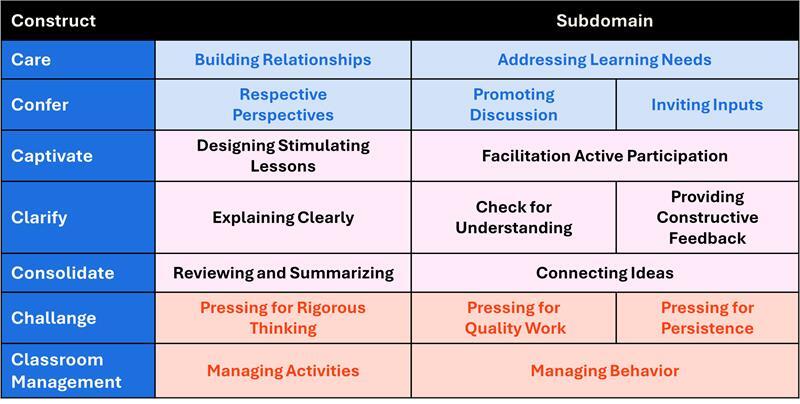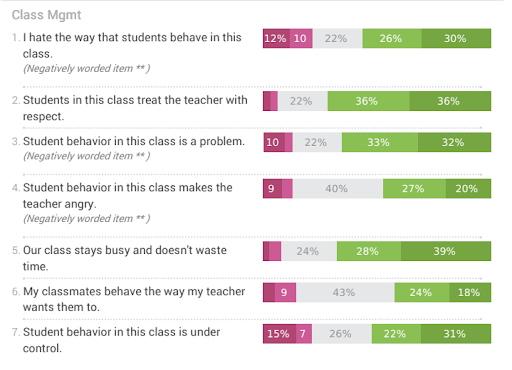How Strong Are Your Schools’ Instructional Practices?
Discover Your Leadership Strengths with Our Self-Assessment
The Local Pulse by Education Elements Leader Self-Assessment helps school leaders gain valuable insights into their instructional practices. This assessment is built on our research-validated 7Cs framework, which is organized into three key conceptual categories.
Ready to get started? You can explore each category by scrolling down or clicking here to jump ahead.
If you're taking the survey on a mobile device, or are having difficulty seeing the survey, you can open it in a new browser here.
The Local Pulse by Education Elements
Personal Support
Cultivating teacher-student relationships and a classroom climate where students feel valued and welcomed
 Care
Care
Show concern for students’ emotional and academic well-being by building relationships and addressing learning needs
 Confer
Confer
Encourage and value students’ ideas and views by respecting perspectives, promoting discussion and inviting input
Curricular Support
Teaching in ways that make the curriculum engaging, accessible, and coherent
 Captivate
Captivate
Spark and maintain student interest in learning by designing stimulating lessons and facilitating active participation
 Clarify
Clarify
Help students understand content and resolve confusion by explaining clearly, checking for understanding and providing constructive feedback
 Consolidate
Consolidate
Help students integrate and synthesize key ideas through review and summarize and connecting ideas
Academic Press
Fostering classroom conditions that require students to stay focused on achieving their full potential
 Challenge
Challenge
Insist that students persevere and do their best work by pressing for rigorous thinking and quality work
 Classroom Management
Classroom Management
Foster orderly, respectful, and on-task classroom behavior by managing activities and behavior
TRUSTED BY 350+ DISTRICTS AND STATES WORLDWIDE





Local Pulse by Education Elements
Framework for Effective Teaching
The 7Cs framework of effective teaching and associated survey measures capture essential elements of instructional practice.
The 7Cs framework groups components into conceptual categories: support (care, confer, captivate, clarify, and consolidate); and academic press (challenge and classroom management). See the image to the right.
Our 7Cs downloadable guide provides details about the 7Cs framework, including indicators of exemplary practice, reflection questions, and sample strategies, as well as sample survey items related to each of the 7Cs components.

Ongoing Support with Quality Monitoring
We collaborate with you to make sense of the data and work with you to inform your strategy, adjust practice, and improve habits.
We are intentionally not a software company. In fact, we believe this is complex work that happens through conversations and over time.
We may look at the readout below, for instance, to inform and facilitate conversations across staff and leaders to drive instructional strategy as well as monitor program quality and improvements.

Unlike Anything Else
It’s unlike anything districts already do.
- Connection to Student Achievement: The quality and specificity of this data provides clear actionable instructional improvements that are proven to lead to student success.
- Granularity: The 7Cs is granular to the classroom level (and can roll up to the school and district level), when others aggregate only at the school and district level.
All told, educators and leaders have the lenses to see the impact of their work.
Validated by Research
Many research studies have highlighted the reliability and validity of data collected with the 7Cs surveys, including the Bill & Melinda Gates Foundation’s Measure of Effective Teaching (MET) Project, which used Local Pulse by Education Elements surveys as one of its key metrics with more than 3,000 teachers. It’s also aligned to and effectively used with Danielson Framework for Teaching.
Today, the Local Pulse by Education Elements uses millions of student responses across nearly 250,000 classrooms to benchmark and calibrate results, and individualized reports for teachers and school leaders highlight strengths and opportunities for improvement.
We've Done This Work Before
Feedback loops to drive rapid instructional improvements
Coming out of state receivership, Harrisburg PA experienced significant turnover, and teams needing instructional support. Leaders used the 7Cs data to gather school-level, and then teacher-level data to guide support for targeted teachers. This feedback loop enabled rapid improvements in learning and student success.
Transformative Leadership
After having worked with Education Elements for 5 years to refine its approach to instruction and implement personalized learning, the Enlarged City School District of Middletown in New York refined its own practices and habits to ensure the sustainability of initiatives in the long term.
New School Design and Implementation
As the 15th largest district in the country, Wake County Public School System was faced with keeping up with the demands of a rapidly growing population. WCPSS worked with Education Elements to design a new "personalized learning school" from the ground up, with a fresh approach to traditional structures and processes along the way.
Personalized Learning
Syracuse City School District struggled with low proficiency levels in math and ELA, and partnered with Education Elements to support instructional transformation across all schools. We developed the capacity of school teams, and connected their vision to district guardrails, resulting in significant improvements for students and staff.
Why Partner with Education Elements
“The most important way that partnering with Ed Elements has proved effective is the impact on developing teams within each of the districts and beyond. The resources that Ed Elements brings to the table have been extremely helpful in developing long-term success.”
